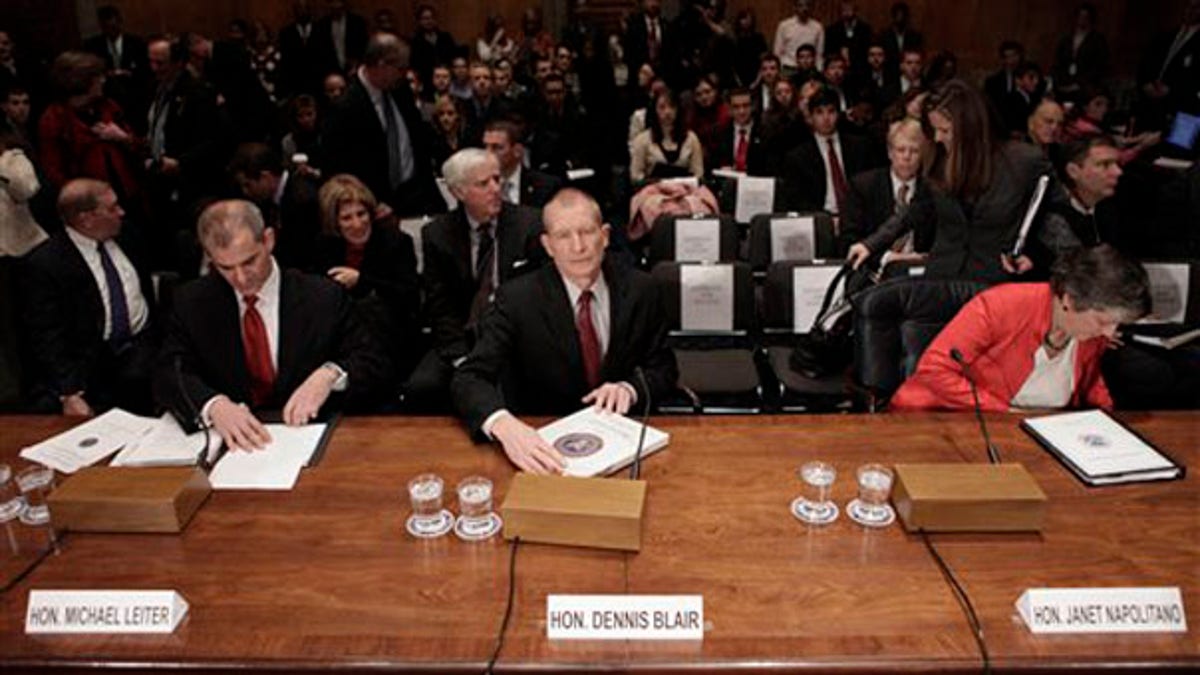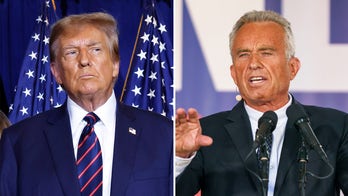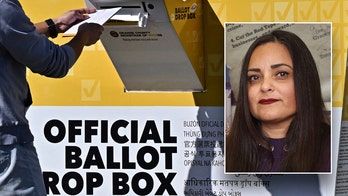
From left, National Counterterrorism Center Directir Michael Leiter, Director of National Intelligence Dennis Blair, and Homeland Security Secretary Janet Napolitano take their seats before testifying on Capitol Hill Jan. 20. (AP Photo)
Director of National Intelligence Dennis Blair, in a candid assessment of what went wrong before and after the attempted bombing of a Northwest Airlines flight on Christmas, said he had wrongly caved to external "pressure" to trim the no-fly list and even admitted the intelligence community would probably drop the ball in the future.
The visibly frustrated director spoke Wednesday alongside other top officials in a hearing before the Senate Homeland Security Committee. The intelligence director as well as Michael Leiter, director of the National Counterterrorism Center, both said at the outset that the system failed and they are making changes to correct it.
In one specific criticism, Blair said suspect Umar Farouk Abdulmutallab should have been questioned by the recently created High-Value Detainee Interrogation Group, or HIG. As he explained the need to use the interrogation unit for such cases in the future, he made an offhand remark that carried a touch of defeatism.
"We'll make a new mistake. We won't make that one," he said.
It was one of several startlingly blunt remarks from the intelligence chief.
In another exchange, Blair expressed disappointment that so many leaks about who knew what when have emerged in the course of the internal review.
"I wish people would just shut the hell up," he said.
Blair also said criteria for adding people to the government's "no fly" list was too legalistic. He said that in recent years there has been pressure to shrink rather than expand the list because of a cascade of complaints from people getting "hassled" by authorities.
"Why are you searching grandmothers?" was a too-common refrain, he said.
Though the Obama administration has since moved to expand the list in the wake of the terror attempt, Blair said analysts were being told to cast a "very fishy eye" on including more names for "several years before 2008."
His assessment was essentially a repudiation of the way the United States has been processing this information for years. Since the Christmas episode, the list has been expanded, he said.
"Shame on us for giving into that pressure," Blair said. "I should not have given into that pressure, but it was a factor and we've certainly changed that attitude.
"We have to maintain that over a course not just of six years, but of 12 years and until this campaign finally ends."
Sen. Joe Lieberman, I-Conn., chairman of the committee, applauded Blair for his assessment, saying the "legal standard" for accepting names on terror watch lists has presented problems.
"I think we were erring too much on the side of a legalistic vision of privacy, or even convenience, that ultimately jeopardized the security of the majority," Lieberman said.
As for the way Abdulmutallab was handled after his arrest, Blair said the HIG should have "automatically" been deployed to interrogate the suspect, even though it was originally designed to deal with terror suspects captured overseas.
"That unit was created exactly for this purpose," Blair said. "We did not invoke the HIG in this case. We should have."
Instead, Abdulmutallab was interviewed by federal law enforcement investigators when Northwest Flight 253 landed in Detroit.
Afterward, Blair released a statement defending the way the FBI conducted its interrogations, after it was noted that the HIG has not yet had its charter finalized.
"My remarks today before the Senate Committee on Homeland Security and Governmental Affairs have been misconstrued. The FBI interrogated Umar Farouk Abdulmutallab when they took him into custody. They received important intelligence at that time, drawing on the FBI's expertise in interrogation that will be available in the HIG once it is fully operational," he said.
So far, nobody has been disciplined in the wake of the terror attempt. Though Obama appeared to wave off calls for resignations when he unveiled the results of a preliminary review earlier this month, Lieberman said Wednesday that anyone who "did not perform up to the requirement of their jobs" should be "disciplined or removed."
In a separate hearing before the Senate Judiciary Committee, FBI Director Robert Mueller said Al Qaeda and its offshoots are spreading and rebuilding. He said the U.S. has dismantled much of Al Qaeda's infrastructure in Afghanistan, but the terror network and its associated groups are rebuilding in Pakistan, Yemen, and the Horn of Africa.
In a testy exchange with Sen. Jeff Sessions of Alabama, the senior Republican on the committee, Mueller said Abdulmutallab made statements to FBI agents before being given his Miranda warnings.
Sessions argued it was inappropriate to arrest the suspect and put him in the criminal justice system, and said that instead he should have been declared an enemy combatant and turned over to military authorities for interrogation.
"Intelligence is what saves lives," said Sessions, his voice rising. "It sounds to me like the guys on the ground just made a decision on the fly."
Since the incident, Republicans have argued the Obama administration mishandled the case by treating it as a crime rather than an act of war.
Mueller defended the decision to arrest the young Nigerian as very appropriate "based on an ongoing very fluid situation."
The director insisted it was important for the FBI to talk to the suspect not just to find out what he'd done but find out "what other threats were out there that need to be addressed."
Also testifying before the Senate Judiciary Committee was State Department official Patrick Kennedy, who said one of the flaws exposed by the Christmas case was the name-checking software at his agency.
By misspelling the suspect's name, agency officials did not realize he had already been issued a visa. Such alternative spelling software was used only in checking names before a visa was issued, Kennedy said.
"We slipped up," said Kennedy, under secretary of state for management. He admitted that a misspelling of the suspect's name and a lack of a particular type of software helped Abdulmutallab avoid detection even after his father had alerted U.S. authorities to indications that he had become radicalized.
The software is now being added for name-checks done after a visa is granted, Kennedy said.
Senior administration officials are on Capitol Hill for a series of congressional hearings about how Abdulmutallab allegedly was allowed to board the plane with the makings of an improvised bomb.
A White House report this month outlined a series of missteps, including name misspellings, ignored warnings and oversights. But for a failed detonator and the swift action of passengers, the attack might have killed all 289 people aboard.
The Associated Press contributed to this report.




